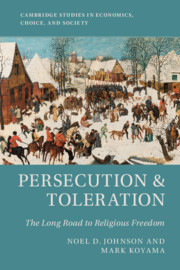Preface
Published online by Cambridge University Press: 18 February 2019
Summary
Today many liberal values are under pressure as a result of tensions arising from a complex combination of economic stress, populism, and large-scale immigration. Religious freedom is a crucial component of liberalism. Yet both ordinary language and judicial interpretations of what this freedom entails and what it means to be “tolerant” are increasingly contested.
In this environment, it is ever more important to understand the origins and development of liberal values such as religious freedom. This is the aim of our book.We seek to understand the rise of religious freedom inWestern Europe from the Middle Ages to the modern age.
In so doing we provide a history of the rise of liberalism and of modern states. The Canadian philosopher Charles Taylor describes the present as A Secular Age (2007). Church attendance is falling, not only in Western Europe where the decline has been evident for decades, but also more recently in North America. But this should not obscure the importance of religion for understanding either past societies or the present. Not least, the freedom of individuals to choose their own religious faith is crucial to the more general principles of freedom of thought and freedom of conscience. To put it bluntly, to understand the rise of liberalism, one has to study the history of religious freedom. And to understand religious freedom, one needs to study the historical relationship between religion and the state.
Religious freedom did not exist in the premodern world. Because of the role religion played in upholding political order by offering legitimacy to rulers, political elites sought control over religious practice. In the absence of genuine religious freedom, there was at best what we call conditional toleration.
We document how these concerns helped shape a self-reinforcing equilibrium that governed most premodern societies and how a series of developments inWestern Europe after 1500 undermined it. Our argument focuses on changes at the level of institutions that gave rise to the rule of law and to religious and other freedoms.
This book is a work of social scientific history. It is history, as we are primarily interested in explaining how religious liberty arose, rather than in drawing direct policy lessons for today or in making moral or philosophical arguments.
- Type
- Chapter
- Information
- Persecution and TolerationThe Long Road to Religious Freedom, pp. xi - xiiPublisher: Cambridge University PressPrint publication year: 2019

